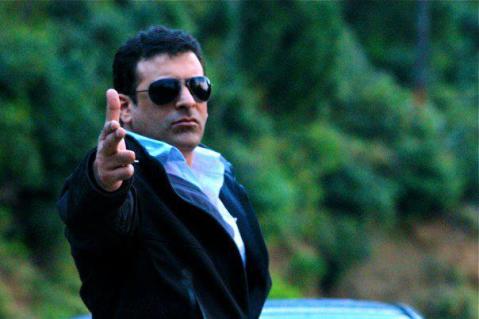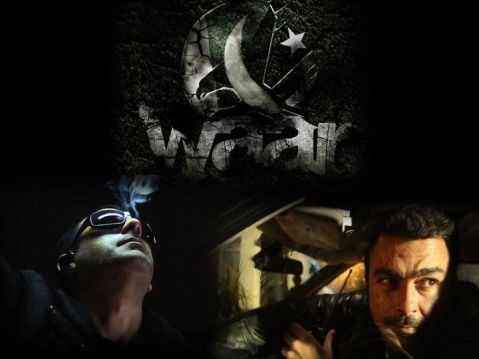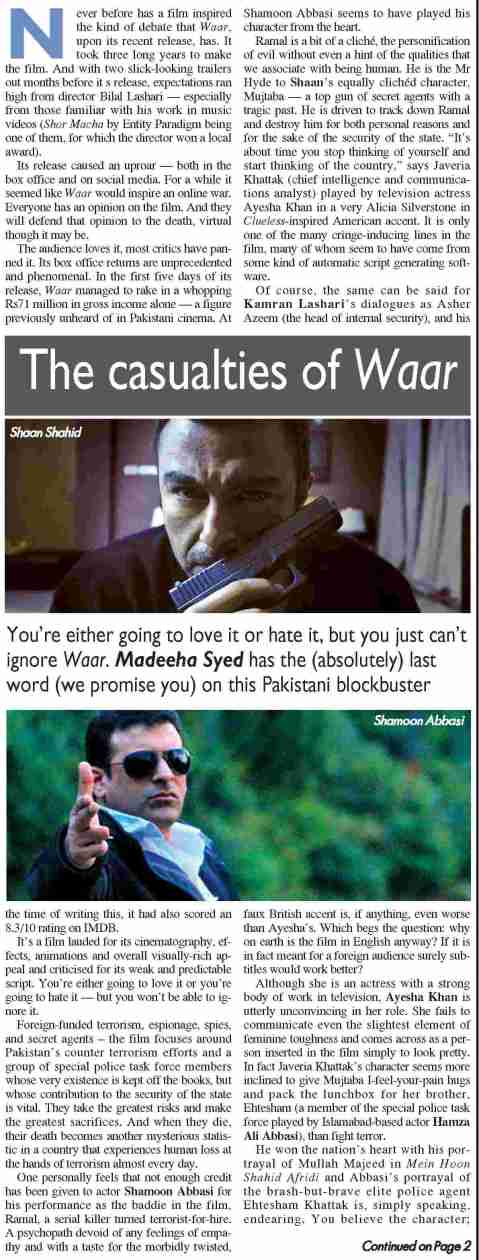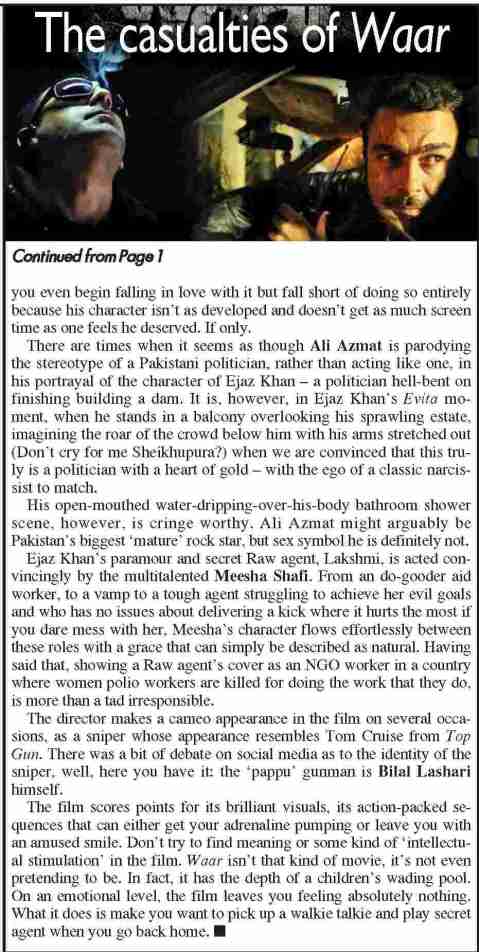Cinemascope: The casualties of Waar
You’re either going to love it or hate it, but you just can’t ignore Waar. Madeeha Syed has the (absolutely) last word (we promise you) on this Pakistani blockbuster
Never before has a film inspired the kind of debate that Waar, upon its recent release, has. It took three long years to make the film. And with two slick-looking trailers out months before it s release, expectations ran high from director Bilal Lashari — especially from those familiar with his work in music videos (Shor Macha by Entity Paradigm being one of them, for which the director won a local award).
Its release caused an uproar — both in the box office and on social media. For a while it seemed like Waar would inspire an online war. Everyone has an opinion on the film. And they will defend that opinion to the death, virtual though it may be.
The audience loves it, most critics have panned it. Its box office returns are unprecedented and phenomenal. In the first five days of its release, Waar managed to rake in a whopping Rs71 million in gross income alone — a figure previously unheard of in Pakistani cinema. At the time of writing this, it had also scored an 8.3/10 rating on IMDB.
It’s a film lauded for its cinematography, effects, animations and overall visually-rich appeal and criticised for its weak and predictable script. You’re either going to love it or you’re going to hate it — but you won’t be able to ignore it.
Foreign-funded terrorism, espionage, spies, and secret agents – the film focuses around Pakistan’s counter terrorism efforts and a group of special police task force members whose very existence is kept off the books, but whose contribution to the security of the state is vital. They take the greatest risks and make the greatest sacrifices. And when they die, their death becomes another mysterious statistic in a country that experiences human loss at the hands of terrorism almost every day.
One personally feels that not enough credit has been given to actor Shamoon Abbasi for his performance as the baddie in the film, Ramal, a serial killer turned terrorist-for-hire. A psychopath devoid of any feelings of empathy and with a taste for the morbidly twisted, Shamoon Abbasi seems to have played his character from the heart.
Ramal is a bit of a cliché, the personification of evil without even a hint of the qualities that we associate with being human. He is the Mr Hyde to Shaan’s equally clichéd character, Mujtaba — a top gun of secret agents with a tragic past. He is driven to track down Ramal and destroy him for both personal reasons and for the sake of the security of the state. “It’s about time you stop thinking of yourself and start thinking of the country,” says Javeria Khattak (chief intelligence and communications analyst) played by television actress Ayesha Khan in a very Alicia Silverstone in Clueless-inspired American accent. It is only one of the many cringe-inducing lines in the film, many of whom seem to have come from some kind of automatic script generating software.
Of course, the same can be said for Kamran Lashari’s dialogues as Asher Azeem (the head of internal security), and his faux British accent is, if anything, even worse than Ayesha’s. Which begs the question: why on earth is the film in English anyway? If it is in fact meant for a foreign audience surely subtitles would work better?
Although she is an actress with a strong body of work in television, Ayesha Khan is utterly unconvincing in her role. She fails to communicate even the slightest element of feminine toughness and comes across as a person inserted in the film simply to look pretty. In fact Javeria Khattak’s character seems more inclined to give Mujtaba I-feel-your-pain hugs and pack the lunchbox for her brother, Ehtesham (a member of the special police task force played by Islamabad-based actor Hamza Ali Abbasi), than fight terror.
He won the nation’s heart with his portrayal of Mullah Majeed in Mein Hoon Shahid Afridi and Abbasi’s portrayal of the brash-but-brave elite police agent Ehtesham Khattak is, simply speaking, endearing. You believe the character; you even begin falling in love with it but fall short of doing so entirely because his character isn’t as developed and doesn’t get as much screen time as one feels he deserved. If only.
There are times when it seems as though Ali Azmat is parodying the stereotype of a Pakistani politician, rather than acting like one, in his portrayal of the character of Ejaz Khan — a politician hell-bent on finishing building a dam. It is, however, in Ejaz Khan’s Evita moment, when he stands in a balcony overlooking his sprawling estate, imagining the roar of the crowd below him with his arms stretched out (Don’t cry for me Sheikhupura?) when we are convinced that this truly is a politician with a heart of gold — with the ego of a classic narcissist to match.
His open-mouthed water-dripping-over-his-body bathroom shower scene, however, is cringe worthy. Ali Azmat might arguably be Pakistan’s biggest ‘mature’ rock star, but sex symbol he is definitely not.
Ejaz Khan’s paramour and secret Raw agent, Lakshmi, is acted convincingly by the multitalented Meesha Shafi. From an do-gooder aid worker, to a vamp to a tough agent struggling to achieve her evil goals and who has no issues about delivering a kick where it hurts the most if you dare mess with her, Meesha’s character flows effortlessly between these roles with a grace that can simply be described as natural. Having said that, showing a Raw agent’s cover as an NGO worker in a country where women polio workers are killed for doing the work that they do, is more than a tad irresponsible.
The director makes a cameo appearance in the film on several occasions, as a sniper whose appearance resembles Tom Cruise from Top Gun. There was a bit of debate on social media as to the identity of the sniper, well, here you have it: the ‘pappu’ gunman is Bilal Lashari himself.
The film scores points for its brilliant visuals, its action-packed sequences that can either get your adrenaline pumping or leave you with an amused smile. Don’t try to find meaning or some kind of ‘intellectual stimulation’ in the film. Waar isn’t that kind of movie, it’s not even pretending to be. In fact, it has the depth of a children’s wading pool. On an emotional level, the film leaves you feeling absolutely nothing. What it does is make you want to pick up a walkie talkie and play secret agent when you go back home.
Newspaper view: [Click for larger image]





Your review of the movie is so “spot on”. It released here in the gulf last week, and just like every other overseas pakistani, me and my husband couldn’t wait to get our tickets to watch the movie that seems to have broken all records in Pakistan. It will not be wrong to say that both of us had alot of expectations from the movie and Bilal Lashari, simply because it was a product of 4 years of hard work (that again is debatable).
Me and my husband, both have Media production background, so obviously, we had to judge even the tiniest aspect. I’m surprised how and why are all Pakistanis so much in love with the movie. To be honest, the story is not new, the characters seem to be a rip off of hollywood movies/shows, music is disturbing and oddly placed, actors clearly were not comfortable in delivering their lines in English, etc.
Obviously, being a Pakistani i love to see the talent our country grow and go international, but having said that, I would never want the international media to point out flaws in our work, simply because we, PAkistanis, couldn’t be honest enough for once and tell each other their mistakes.
Another thing that I do not understand is that why dont we make films that give a better image of Pakistan or maybe just like a bollywood masala movie. Aren’t the audience tired of watching the same kind of stories one after the other?
The conclusion ive reached to is that our film makers make movies only for Paksitanis living in Pakistan (even if they say otherwise), they understand the narrow minds of our people and their hatred towards India, hence they have to have an element relating to India, in some way or the other.
I really wish, someone could tell Bilal Lashari for his improvisation. And yes, he should also understand that a person can be good at one, two or maybe three things, not in everything. Why did he have to be the Director, DOP, Cinematographer, Editor, actor and everything else in the movie?
I watched the movie 2 days back, and I’m in deep depression ever since. I dont know if Im disappointed on the taste of Pakistanis or simply in Bilal Lashari. I can still write so much about the movie here, but that will just add to my depression and disappointment more.